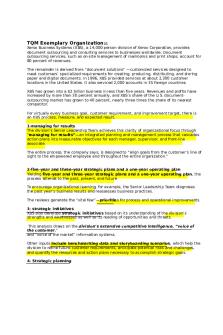Kingsford Charcoal Case Summary ONLY PDF

| Title | Kingsford Charcoal Case Summary ONLY |
|---|---|
| Author | Ismail Chaniago |
| Course | Marketing Management |
| Institution | Macquarie University |
| Pages | 2 |
| File Size | 36.2 KB |
| File Type | |
| Total Downloads | 9 |
| Total Views | 134 |
Summary
Download Kingsford Charcoal Case Summary ONLY PDF
Description
The Clorox Company was founded in 1913 as the Electro-Alkaline Company and began business with the introduction of its industrial strength bleach, originally made in California and sold in the Bay Area. The Clorox Company became the leading producer of bleach in the U.S. by 1957 and by 2000, Clorox sold over 50 products that was marketed to consumers globally. This included “Kingsford Charcoal” that was founded in the 1920s that offers charcoal briquettes that “burn longer and hotter than wood” and is manufactured by using wood scraps. The demographics of Kingsford’s target market consists of 3 in 4 US householders owning a barbeque grill, with over 80% of younger age and belonging to larger, high income families. Kingsford acknowledges the large market of individuals who are medium to heavy users of barbeque grills, using their grills for 85% of occasions and thus, frequently requiring charcoal briquettes. Competition for Kingsford Charcoal is quite minimal, with its main competitors being Royal Oak (7.7% market share, 2000) and private labels (34.9% market share), which are mainly owned by Royal Oak. Despite Kingsford owning over 50% of the market, it encountered various problems. It was apparent in July of 2000, Kingsford saw a decline in growth and sales revenue, seeing a decrease in stock price due to being at a three-year-low, and experiencing shortfalls in predicted sales and growth (6% sales decline). Moreover, Kingsford had rarely invested its capital into advertising as seen in its reduction from media spending to $1 million (2000) from $6 million (1998). On the other hand, gas grilling media spending had increased in this same period from $4 million to $10 million. It was evident that “the charcoal category was now paying the price for several years of reduced advertising”. In addition, it was evident that the coal industry was declining in comparison to the gas grilling industry, as the year 2001 saw a shift of usage from charcoal grills to gas grills (>50%). In addition, the market for Kingsford Charcoal, or coal in general was seasonal. Unless the weather was “great”, sales were minimal. Declines in growth is particularly attributed to the worsening of weather in
October to December of 2000, compared to 1999, seeing an average decrease of 10 degrees in temperature and increase in rainfall. Consequently, as Kingsford is a major part of Clorox’s business, when there are decreases in sales revenue for Kingsford and predictions are not met, it is clear Clorox will also see declines in growth. Thus, Kingsford was experiencing declines, with the potential to decline even further....
Similar Free PDFs

Banacharcoal (Banana Charcoal)
- 21 Pages

1 - only for short summary
- 2 Pages

Carmichele Case - case summary
- 53 Pages

CASE summary - Case summarisa
- 3 Pages

Case summary
- 70 Pages

Case summary
- 2 Pages

Case Summary - contract b case
- 9 Pages

Ikea Case - Ikea case summary
- 1 Pages

Boeing 767 Case Summary
- 4 Pages

Case study summary
- 2 Pages

Case Processing Summary
- 3 Pages

Alcock case summary
- 1 Pages

Case summary Gabcikovo Nagymaros
- 15 Pages
Popular Institutions
- Tinajero National High School - Annex
- Politeknik Caltex Riau
- Yokohama City University
- SGT University
- University of Al-Qadisiyah
- Divine Word College of Vigan
- Techniek College Rotterdam
- Universidade de Santiago
- Universiti Teknologi MARA Cawangan Johor Kampus Pasir Gudang
- Poltekkes Kemenkes Yogyakarta
- Baguio City National High School
- Colegio san marcos
- preparatoria uno
- Centro de Bachillerato Tecnológico Industrial y de Servicios No. 107
- Dalian Maritime University
- Quang Trung Secondary School
- Colegio Tecnológico en Informática
- Corporación Regional de Educación Superior
- Grupo CEDVA
- Dar Al Uloom University
- Centro de Estudios Preuniversitarios de la Universidad Nacional de Ingeniería
- 上智大学
- Aakash International School, Nuna Majara
- San Felipe Neri Catholic School
- Kang Chiao International School - New Taipei City
- Misamis Occidental National High School
- Institución Educativa Escuela Normal Juan Ladrilleros
- Kolehiyo ng Pantukan
- Batanes State College
- Instituto Continental
- Sekolah Menengah Kejuruan Kesehatan Kaltara (Tarakan)
- Colegio de La Inmaculada Concepcion - Cebu


